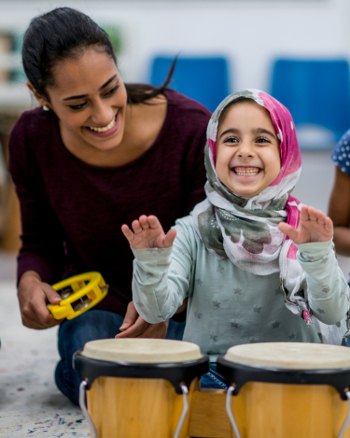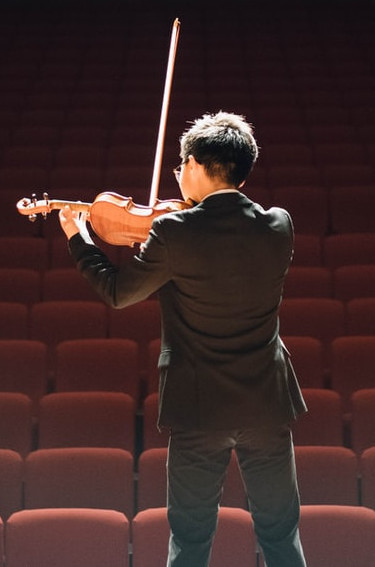 At The Music Place we recognize that the first five years of life are an extraordinary time, filled with wonder and exploration. It's in these early years that the path to future educational success is established. And music is an important stepping stone on that path...
At The Music Place we recognize that the first five years of life are an extraordinary time, filled with wonder and exploration. It's in these early years that the path to future educational success is established. And music is an important stepping stone on that path...
A Positive Experience is a Must!
The philosophy that underlines everything that we do here is based on the understanding that learning must be a positive experience for kids: it should be FUN! In fact, research has consistently verified the fact that highly successful students in all fields1 have one basic thing in common: they have worked through three very different phases of learning:
- Phase 1 (Keep it fun to build momentum.)
- Phase 2 (Momentum helps me work hard to progress.)
- Phase 3 (Progress feeds passion toward excellence.)
PHASE 1!
 Fun, warm, positive: This is the "music-is-so-much-fun-I-want-more" phase. The first phase of learning must inspire the child with the possibilities of the art. This is best accomplished by a warm interaction with an instructor whose love for the children is as obvious as his or her love for the subject. In this environment, a child might respond to a music class, for example, by saying "I LOVE music...but I think I forgot what a quarter note is..." This should be perfectly acceptable when children have truly been inspired about what they are doing. They will desperately want to return to "do it again."
Fun, warm, positive: This is the "music-is-so-much-fun-I-want-more" phase. The first phase of learning must inspire the child with the possibilities of the art. This is best accomplished by a warm interaction with an instructor whose love for the children is as obvious as his or her love for the subject. In this environment, a child might respond to a music class, for example, by saying "I LOVE music...but I think I forgot what a quarter note is..." This should be perfectly acceptable when children have truly been inspired about what they are doing. They will desperately want to return to "do it again."
This first phase is the most critical phase of a student's development, and actually begins in the home environment, and often as many believe, even in the womb! A child's experience in the beginning will set the tone and course for their life attitude in the subject they study. It will determine how much energy they will release to move them through the next phase. Phase I usually lasts 1-3 years.
It is extremely rare (if even possible) to fully develop the innate gifting in a child's life without first inspiring him. This helps him stay motivated enough to work through the second, more difficult phase of learning. The real goal of Phase 1 is to draw the child into Phase 2.
PHASE 2!
 Technical Development: The "hard work" phase. Eventually (depending upon the age and abilities of the child), children who are progressing because they are enjoying the process will move into a phase of learning that requires more work and discipline. Although the basic techniques and approach must be taught in the first phase of learning, the second phase reinforces these issues and focuses on giving clearer understanding of the theory, and it must develop long term skills that are essential to a high level of excellence and achievement. This is the longest and most varied phase of learning, lasting anywhere between 5 and 15 years.
Technical Development: The "hard work" phase. Eventually (depending upon the age and abilities of the child), children who are progressing because they are enjoying the process will move into a phase of learning that requires more work and discipline. Although the basic techniques and approach must be taught in the first phase of learning, the second phase reinforces these issues and focuses on giving clearer understanding of the theory, and it must develop long term skills that are essential to a high level of excellence and achievement. This is the longest and most varied phase of learning, lasting anywhere between 5 and 15 years.
Interestingly enough, few children can be easily identified as high achievers until they have almost completed this phase of learning.
PHASE 3!
Excellence: The "passion-is-my-own-and-I-really-want-to-work-at-this" phase. The third and most advanced phase of learning requires a teacher of great technical skill who can readily communicate the finer points of the subject. In music for example, a student who can readily play any piano sonata must also understand the period of time in which it was written, the context of the music, and its original form in order to properly interpret and present it. It is in this phase that sensitivity to the art and the audience is refined. For a performing musician, it is preparation for the concert stage. For the potential teacher, it is the development of tools with which one can communicate the art he or she has long studied.
Although few students persevere to reach the third phase of learning, a good teacher will always draw from the third phase processes even at the most elementary levels. This will allow even the youngest student to achieve a high degree of excellence long before their skill level warrants something as intimidating as Carnegie Hall.
SPECIAL NOTE: Many parents assume that a child who has potential to achieve excellence must begin with a Phase 3 teacher. This, in our opinion, is very rarely the case, simply because it is extremely rare for one teacher to be effective in teaching all three phases of learning. Those who are warm, exciting and patient with very small children are rarely those who have spent the years of serious study needed to be a Phase III teacher, for example.
Read about the history of The Music Place
1. pgs. 279-286 "From Tyro to Virtuoso", by Lauren Sosniak from Music and Child Development, Frank R. Wilson & Franz L. Roehman, Editors

